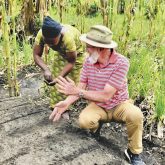For some families in countries without social safety nets, surviving the COVID-19 pandemic has forced them to eat less or sell assets that might have helped them recover, says the Canadian Foodgrains Bank.
“The numbers of people who will be experiencing hunger are going up,” said Musu Taylor-Lewis, director of resources and public engagement at the Foodgrains Bank. “It’s going to be a bit of a long haul.”
The Canadian Foodgrains Bank is a partnership of Canadian churches and faith-based organizations which gives food relief and agricultural programming around the world.
Read Also

Winter is the best time to see owls in Manitoba
The snowy owl is the iconic species, but there are plenty of other superb owls to be seen in winter throughout Manitoba, Donna Gamache writes.
COVID-19 has served to amplify troubles in Lebanon and other areas.
“The areas of greatest need really haven’t changed that much because of COVID-19 and the pandemic containment efforts,” said Taylor-Lewis. “It’s basically exacerbated already existing emergencies.”
In Lebanon, a quarter of the population are refugees, said Taylor-Lewis. The needs and the pressure on the economy were already huge. COVID-19 created an economic crisis. Prices rose over 160 per cent in some cases, she said.
In August, a massive explosion in the Port of Beirut destroyed grain elevators along with homes, businesses and infrastructure. Eighty per cent of food stores at the port were damaged, said Taylor-Lewis. In the immediate aftermath, people were seeking health care and shelter. With so much food destroyed, many found themselves hungry.
Foodgrains Bank members were there within the first week of the explosion, said Taylor-Lewis. They began with giving food baskets, then food vouchers for families to redeem in local markets. They’ve given food to over 1,000 families, she said, and plan to add more programs in the coming weeks and months.
In areas without social safety nets, some people are coping by eating less or cheaper, less nutritious food. Others are selling assets like livestock and tools, said Taylor-Lewis. Ultimately this will mean it takes longer for these families to recover without those assets.
In East Africa, where Foodgrains Bank partners train and support farmers, workers are doing three basic things, said Taylor-Lewis. They’re supporting co-operative savings and loan groups so farmers can get credit to buy inputs, they’re assisting farmers in finding markets for their crops, and they’re ensuring that ag support and extension work goes on.
“Whatever gains we had, we really stood to lose,” said Josephine Munywoki in an Oct. 26 Foodgrains Bank report. Munywoki is director of Fadhili Trust, a Canadian Foodgrains Bank and Tearfund partner in Kenya.

Like in North America, some training became remote or online. Fadhili set up a WhatsApp messaging group so staff could provide ongoing support. They reduced training group sizes and hosted them outside to ease physical distancing. Fadhili staff communicated by mobile phone, the report says.
Meanwhile, the staff worked to develop a natural pesticide to tackle the onslaught of fall army worm Kenyan farmers were facing.
In Canada, despite challenges of COVID-related safety measures and shutdowns, supporters were quick to ask CFGB how it would respond to the pandemic around the world. The organization quickly put on informational webinars about needs around the world, said Taylor-Lewis.
The result was an outpouring of support. Despite having to diverge from normal fundraising events — e.g. letters, phone calls, an online ‘virtual concert’ — Foodgrains Bank supporters raised 30 per cent more money in the first half of 2020 than they had in the same time frame last year.
“It just seemed like putting out the information alone really alerted Canadians to the need,” said Taylor-Lewis. “They responded surprisingly strong, but not surprising just knowing the generosity that we’ve enjoyed all these years.”
















